
views
- Your husband may belittle you with phrases like “You’re worthless,” or “I don’t need you.” He may try to gaslight you by saying, “You’re imagining things.”
- Or, he may try to shut down arguments by saying things like, “That’s the dumbest thing I’ve ever heard.”
- Assert your boundaries by saying, "That's rude and hurtful. Even when you're upset, you still need to respect me."
- Work together to improve your communication and treat each other with respect. Consider leaving if he doesn't make an effort to change and speak kindly to you.
“I hate you.”
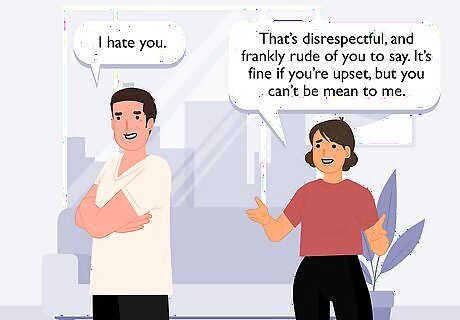
When your spouse says they hate you, it’s very hurtful. Marriage is based on love and companionship, not hate and contempt. Even if he doesn’t technically mean it, in the moment, it’s still very hard to hear. If your husband has said that he hates you, say something like, “That’s disrespectful, and frankly rude of you to say. It’s fine if you’re upset, but you can’t be mean to me.” If you let it slip that you hate your spouse, apologize profusely and then examine those feelings. Try saying something like, “I’m really sorry, I don’t hate you. I’m just upset because of the argument that we’re having.”
“I don’t need you.”

Not needing someone is a form of rejection. When your spouse pushes you away and says that they’re better off without you, it’s hard to hear. It might make you think that your marriage is one-sided, or that your husband never actually loved you. Ask your husband, “Do you need some space right now?” That way, he can take a moment to calm down and think of what he really wants to say. If you’re the one who said this hurtful statement, try to communicate your feelings and let your spouse know that you’re feeling overwhelmed. “I’m kind of flustered right now. Could we take a break?”
“You’re worthless.”
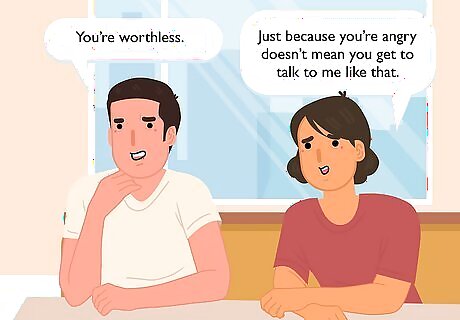
Being called worthless is a way to tear you down. If your husband has called you bad names like this before, he may be using this as a tactic to lower your self-esteem. Narcissists and abusers will often belittle their partners to make them stay, since they believe that no one else will love them. Remember that you are enough, and your husband doesn’t get to talk to you that way. Do things to improve your self esteem, like taking care of yourself and engaging in fun hobbies, to make yourself feel better. Remind your husband that name-calling is never okay, even when he’s angry. Say something like, “Just because you’re angry doesn’t mean you get to talk to me like that.” If you said this to your partner, apologize and then follow up with, “I should never have said that. I was just upset, but that’s not an excuse.”
“You only care about yourself.”
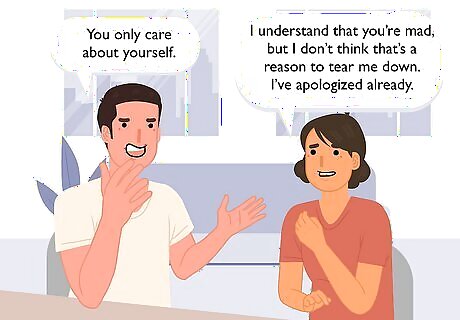
An accusation of selfishness is designed to make you feel bad. When your husband hits you with a phrase like this, it’s likely to stick around in your head for a while. This is because this is a character assassination, or a judgment on who you are as a person. Ask your husband to criticize your actions instead of your character next time he’s upset. “I understand that you’re mad, but I don’t think that’s a reason to tear me down. I’ve apologized already.” Instead of calling your partner selfish, articulate the real reason you’re mad, using “I” statements. “When you forgot to pick up milk from the store, it made me feel like you didn’t think my needs were important.”
“You’re not very smart.”

Criticizing your intelligence is a way to tear you down. Maybe you and your husband are in an argument, and you’re trying to explain your side. If your husband disagrees, he might insult your intelligence as a way to tell you that you’re wrong. However, this is very offensive, and it will only drive you two further apart. Ask your partner not to insult your intelligence. Say something like, “You can disagree with me without calling me dumb.” Insults like this can often be a sign of verbal abuse. If you are in an abusive relationship, take steps to safely end things and leave. Instead of calling your partner stupid, try telling them why you disagree with what they’re saying. “I don’t think it’s a good idea to pick the kids up early from school, since they could miss out on important lessons.”
“That’s it. I’m leaving.”

When your husband threatens to leave, he wants you to panic. When you two are in an argument, does your spouse often threaten divorce? This is a way to shut down conversations and force you into apologizing or making things right. Don’t fall for it—it’s unlikely that he’s actually going to leave you. When your husband pulls this move, remind him that he’s done this before. “You said you were going to divorce me last time. You can’t threaten to end the relationship every time you’re mad.” Instead of threatening to leave every time you’re upset, tell your partner that you just need some time to calm down. “Could we take a 10 minute break? I’m feeling really upset, and I need to get my thoughts in order.”
“That’s the dumbest thing I’ve ever heard.”

Insulting what you say is a way to shut you down quickly. When your husband doesn’t want to talk about something, will he refuse to on the basis that it’s “not important”? He’s doing this because he knows it’s a way to get you to move on so he doesn’t have to feel uncomfortable. Remind your husband that he can’t talk to you that way. “You can disagree with what I’m saying, but you can’t insult me like that.” If you’re the one who’s said this to your partner, try expressing your feelings instead of shutting them down. “This is hard for me to talk about, so I’m having a little trouble figuring out what to say right now.”
“You’re whining again.”

Insinuating that an adult is whining is a way to make them feel childish. If you ever bring up a valid complaint, like when your husband doesn’t help around the house, he might pull this phrase out. It’s because he doesn’t want to hear anything negative about himself, even if you say it respectfully and constructively. Say something like, “I’m not whining, I’m explaining why I’m upset.” Instead of telling your partner that they’re whining, listen to what they’re saying and take it into account. If you don’t understand something, ask. “Could you explain to me why this is such a big deal to you?”
“I’m going back to my ex.”

Threats about leaving are a way to keep you in line. If your husband ever tells you that he wishes he was back with his ex-partner, he wants to make you feel jealous and insecure. Even if he says he doesn’t mean it later, you’re unlikely to forget it. If your husband ever says this to you, say something like, “Threatening me like that makes me feel uncomfortable and like you don’t love me.” Instead of telling your partner that you’re going to leave, tell them why you’re upset. “I’m angry because you broke your promise to me, and it makes me feel like you don’t care.”
“You’re just not a good person.”

Implying that you’re a bad person makes you question your integrity. Most of us are mostly good people who are just trying our best. Even when we make mistakes, it doesn’t mean that we’re bad people. When your husband says this to you, he’s making sure that you always doubt your own intentions. Say something like, “This is very hurtful for me to hear. I don’t think you actually mean that.” If you want to express that you’re upset with your partner, don’t call them a bad person. Instead, say something like, “I understand that you’re only human, but that was a big mistake to make. How can we make sure it doesn’t happen in the future?”
“Other people wouldn’t put up with this.”
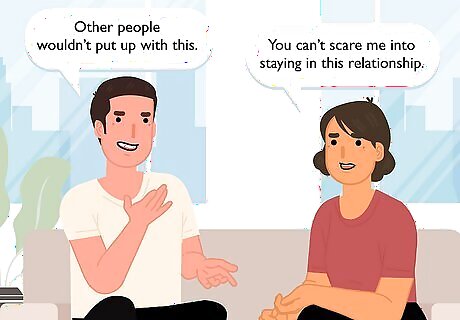
Attacking your character scares you into staying with him. Your husband may be saying this as a way to lower your self-esteem because he’s secretly afraid that you’re going to leave him. Narcissists will often use this to trap people in relationships with them so that they’re never left alone. If your husband says things like this to you, say, “You can’t scare me into staying in this relationship.” Instead of making your partner doubt themselves, work on resolving your issues together. Forcing them to stay with you will make you both unhappy in the long run.
“You’re imagining things.”

He may try to gaslight you to get you to forget about what he's done. Does your husband ever make you feel crazy, or like your sense of reality is warped? This is a tactic used by many abusers, and it’s done to make you feel like you can’t even trust yourself. Look for other signs of gaslighting, like when your husband questions your memory or your version of events. The best way to respond to gaslighting is to stand firm in your own memory. Say things like, “I know what happened,” or, “I’m not imagining things.”
“You take everything too personally.”

Blaming you for your feelings is a way to dismiss you. You can’t help that you have emotions, and whatever you’re feeling is totally valid. When your husband doesn’t want to take something seriously, he might use this phrase to belittle you. Say something like, “I’m not taking things personally, I’m just upset.” Make sure that he knows your concerns are valid and that he can’t just brush you off. If you feel like your partner is taking things too personally, don’t tell them that. Instead, say, “I can tell this is making you feel pretty bad. I want you to know that I didn’t mean it as a personal attack.”
“Are you really going to eat all that?”

Commenting on your weight is a way to make you feel insecure. A husband should never make you feel uncomfortable in your own body. Tearing you down like this is just plain mean, and it shows his blatant lack of respect for you. Comments like these are more warning signs that your marriage may be toxic or abusive. Take steps to leave if you can, and lean on friends and family members for help.
“Our sex life is terrible.”

A broad, negative statement about sex isn’t constructive—it’s just mean. It’s normal for a married couple’s sex life to ebb and flow throughout the relationship. If your husband really wants to work on things with you, he’ll communicate with you about his needs and have an open, honest, and respectful discussion about it. When your husband comments on your sex life, say something like, “Okay, then let’s talk about it. What are you unhappy with? How can we work together to repair things?” If you are truly unhappy with the sex in your relationship, sit down and have a discussion about it. “Honey, could we talk about how things are going in the bedroom? I want to make sure we’re both happy and satisfied.”
“You’re a bad parent.”
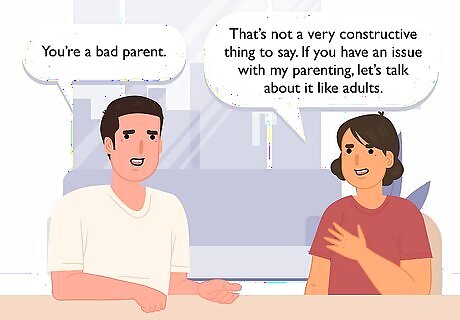
Calling you a bad parent is a way to tear you down. You and your partner may disagree about how to parent your children, but that doesn’t mean either one of you is bad at it. If your partner ever says that you’re a bad parent, it’s not a constructive conversation starter. If your partner has said this to you out of anger, say something like, “That’s not a very constructive thing to say. If you have an issue with my parenting, let’s talk about it like adults.” If you said this out of anger, try opening up a larger conversation instead. Say something like, “I didn’t mean to say that you’re a bad parent; I’m sorry. Could we talk about our parenting styles, though? I’d like for us to be on the same page.”
“I don’t love you anymore.”

When your partner says they don’t love you out of anger, they rarely mean it. While it’s definitely possible for couples to break up because one of them falls out of love, people will sometimes use this scary phrase as a way to frighten their partner or get them to back down. Do a quick sanity check by asking your husband, “Do you really mean that, or are you just upset right now?” Sometimes we say things we don’t mean in the heat of the moment. If you told your partner you don’t love them anymore out of anger, try, “I didn’t mean to say that. I’m just really angry right now and I’m lashing out.”




















Comments
0 comment